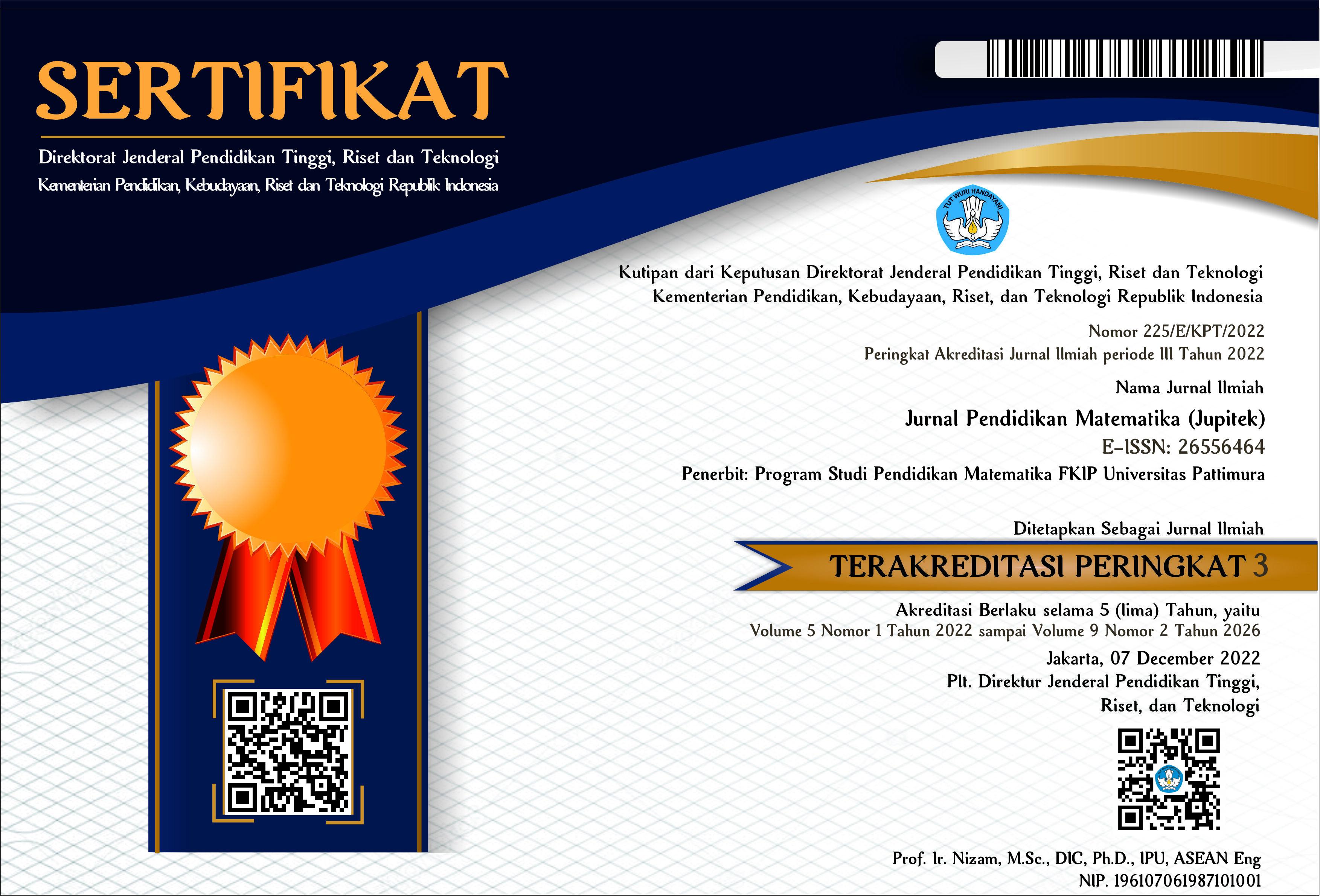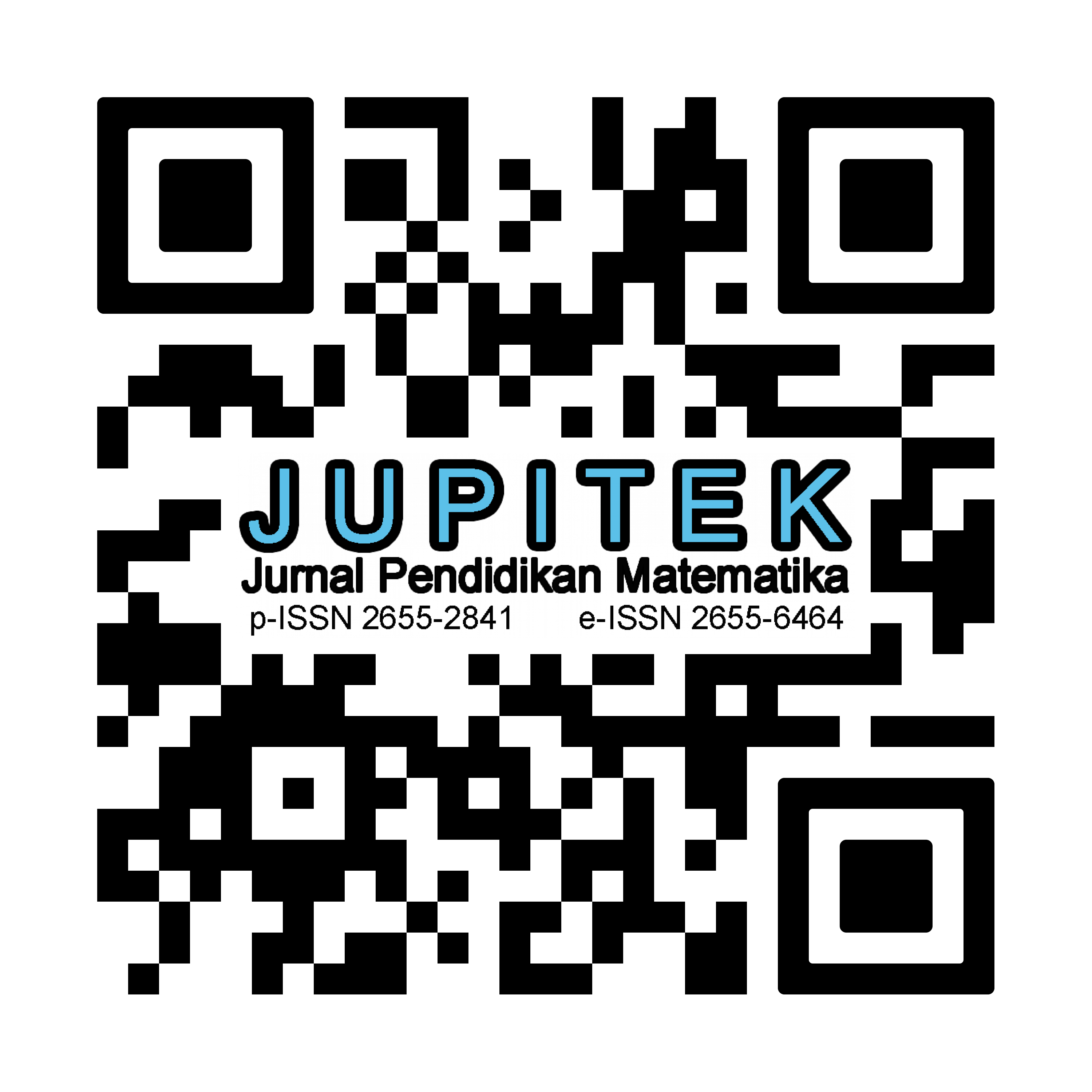PENERAPAN MODEL PEMBELAJARAN PROJECT BASED LEARNING BERBANTUAN GEOGEBRA UNTUK MENINGKATKAN HASIL BELAJAR SISWA
Abstract
This research is based on teachers who rarely use learning models and media to support the learning process so that students are not interested in learning. This study aims to know whether differences in student learning outcomes taught using the Geogebra-assisted Project Based Learning (PjBL) learning model and those taught using conventional learning at SMAN 2 Bireuen. This research is a quasi-experimental research with a quantitative approach. The design used is the Pretest Posttest Control Group Design. The population in this research is all students of class X SMAN 2 Bireuen. In this research, we use the purposive sampling technique. The instrument used is a test consisting of pretest and post-test. N-gain was used to find out the increase in students' pretest and post-test scores. The results of the N-gain calculation show that the application of the Geogebra-assisted PjBL learning model can improve student learning outcomes
Downloads
References
Alkhateeb, M. A., & Al-Duwair, A. M. (2019). The Effect of Using Mobile Applications (GeoGebraand Sketchpad) on the Students’ Achievement. International Electronic Journal Of Mathematics Education, 14(3), 523–533.
Andrianis, R., Anwar, M., & Zulwisli. (2018). Pengaruh Model Pembelajaran Berbasis Projek Terhadap Hasil Belajar Pemograman WEB Dinamis kelas XI Rekayasa Perangkat Lunak di SMK Negeri 2 Padang Panjang. VOTEKNIKA: Jurnal Vokasional Teknik Elektronika & Informatika, 6(1), 123–126.
Arafyana, A. A., Sugita, G., & Murdiana, I. N. (2018). Penerapan Model Pembelajaran Project Based Learning (PjBL) Untuk Meningkatkan Hasil Belajar Siswa Pada Materi Aritmatika Sosial di Kelas VII E SMP Negeri 2 Sigi. Jurnal Elektronik Pendidikan Matematika Tadulako, 5(3), 278–291.
Astuty, V. W. D., & Rudhito, M. A. (2012). Penggunaan Program GeoGebradalam Upaya Mengatasi Kesulitan Belajar Siswa Kelas VIII E SMP N I Nanggulan Kulon Progo Pokok Bahasan Grafik Garis Lurus Pada Pembelajaran Remedial. Seminar Nasional Matematika Dan Pendidikan Matematika, 913–922.
Elmubarak, M. (2020). An Online Semi-Structured Approach To Helping Students Make The Most Of Project-Based Learning (PjBL). IJAEDU- International E-Journal of Advances in Education, 6(18), 357–364.
Fiana, R. O., Relmasira, S. C., & Hardini, A. T. A. (2019). Perbedaan Penerapan Model Project Based Learning Dan Problem Based Learning Terhadap Hasil Belajar Matematika Kelas 4 SD. Jurnal Basicedu, 3(1), 157–162.
Halimah, N., & Sumardjono. (2017). Perbedaan Pengaruh Model Student Teams Achievement Division (STAD) dan Numbered Heads Together (NHT) Terhadap Hasil Belajar Matematika Siswa Kelas V SD. Scholaria: Jurnal Pendidikan Dan Kebudayaan, 7(3), 267–275.
Harahap, K. A., Sinaga, B., & Siagian, P. (2021). Development of Geogebra-Assisted Problem Based Learning (PBL) Learning Tools to Improve Visual Thinking Skills in Mathematical Problem Solving Students of SMA Negeri 1 Samudera. Budapest International Research and Critics in Linguistics and Education (BirLE) Journal, 4(1), 239–251.
Majdi, M. K., Subali, B., & Sugianto, S. (2018). Peningkatan Komunikasi Ilmiah Siswa SMA melalui Model Quantum learning One Day One Question Berbasis Daily Life Science Question. UPEJ Unnes Physics Education Journal, 7(1), 81–90. https://doi.org/10.15294/upej.v7i1.22479
Muhibbuddin, Yustina, N., & Safrida. (2020). Implementation of ProjectBased Learning (Pjbl) Model In Growth And Development Learning to Increase The Students’ Science Literacy And Critical Thinking Skills. IJAEDU- International E-Journal of Advances in Education, 6(16), 66–72.
Niswara, R., Muhajir, & Untari, M. F. A. (2019). Pengaruh Model Project Based Learning Terhadap High Order Thinking Skill. Mimbar PGSD Undiksha, 7(2), 85–90.
Nurhayati, N, & Novianti, N. (2020). Pengaruh SPSS Terhadap Hasil Belajar Pada Materi Statistika Deskriptif. AKSIOMA: Jurnal Program Studi Pendidikan Matematika, 9(1), 101–107. https://doi.org/https://doi.org/10.24127/ajpm.v9i1.2609.
Nurhayati, N. (2019). Pengaruh Strategi Pembelajaran Planet Questions Terhadap Prestasi Belajar Siswa Pada Materi Trigonometri Di Kelas X SMAN 1 Bireuen. Jurnal Pendidikan Almuslim, 7(1), 45–49.
Nurhayati, N. (2020). Pengaruh Peer Teaching Berbantuan Aplikasi SPSS Terhadap Kemampuan Penguasaan Konsep Pada Materi Statistika. Jurnal Gammath, 5(2), 72–78.
Nurhayati, N., Rofiroh, R., & Riski, D. (2021). An Analysis Conceptual Understanding and Student’s Learning Self-Reliance in the New Normal Era Assisted by Photomath on SLETV Material. Atlantik Press: Proceedings of the 1st International Conference on Mathematics and Mathematics Education (ICMMED 2020), 157–161. https://doi.org/https://doi.org/10.2991/assehr.k.210508.058
Ocampo, S. R., & Ocampo, B. C. (2019). Capacity Building Through Project Based Learning In Bayesian Statistics. Proceedings of the Satellite Conference of the International Association for Statistical Education (IASE), 1–5.
Rahmawati, H., Syahrilfuddin, & Noviana, E. (2016). Penerapan Model Project Based Learning Untuk Meningkatkan Hasil Belajar Matematika Siswa Kelas V SD Negeri 018 Sungai Keranji. Jurnal Online Mahasiswa, 3(2), 1–10.
Solekhah, I., Slameto, & Radia, E. H. (2018). Penerapan Model Pembelajaran Project Based Learning Untuk Meningkatkan Hasil Belajar Matematika Kelas II SD. Didaktika Dwija Indria, 6(2), 1–7.
Sugiyono. (2011). Metode Penelitian Pendidikan.
Suherman, Prananda, M. R., Proboningrum, D. I., Pratama, E. R., Laksono, P., & Amiruddin. (2020). Improving Higher Order Thinking Skills (HOTS) with Project Based Learning (PjBL) Model Assisted by Geogebra. Journal of Physics: Conference Series, 1467(1), 1–9. https://doi.org/10.1088/1742-6596/1467/1/012027
Sunita, N. W., Mahendra, E., & Lesdyantari, E. (2019). Pengaruh Model Pembelajaran Project Based Learning Terhadap Minat Belajar dan Hasil Belajar Matematika Peserta Didik. Widyadari, 20(127–145).
Surya, A. P., Relmasira, S. C., & Hardini, A. T. A. (2018a). Penerapan Model Pembelajaran Project Based Learning (PjBL) untuk Meningkatkan Hasil Belajar dan Kreatifitas Siswa Kelas III SD Negeri Sidorejo Lor 01 Salatiga. Jurnal Pesona Dasar, 6(1), 41–54.
Surya, A. P., Relmasira, S. C., & Hardini, A. T. A. (2018b). Penerapan Model Pembelajaran Project Based Learning (pjbl) Untuk Meningkatkan Hasil Belajar dan Kreatifitas Siswa Kelas III SD negeri sidorejo Lor 01 Salatiga. Jurnal Pesona Dasar, 6(1), 41–54.
Wardani, D. K., Suyitno, & Wijayanti, A. (2019). Pengaruh Model Pembelajaran Project Based Learning terhadap Hasil Belajar Matematika. Mimbar PGSD Undiksha, 7(3), 207–213.
Yahya, S. A., & Irfan, D. (2018). Pengaruh Penerapan Model Pembelajaran PjBL Terhadap Hasil Belajar Mata Pelajaran TKBGT Siswa Kelas X Teknik Mekatronika SMK Negeri 1 Sumatera Barat. VOTEKNIKA: Jurnal Vokasional Teknik Elektronika Dan Informatika, 6(2), 61–74.
Yupita, I. A., & S, W. T. (2016). Penerapan Model Pembelajaran Discovery Untuk Meningkatkan Hasil Belajar IPS Di Sekolah DAasar. JPGSD, 1(2), 1–10.

Copyright (c) 2022 Nurhayati Nurhayati, Fatma Zuhra, Osey Putri Salehha

This work is licensed under a Creative Commons Attribution-NonCommercial-ShareAlike 4.0 International License.
License and Copyright Agreement
By submitting a manuscript to Jurnal Pendidikan Matematika (JUPITEK), the author(s) certify and agree to the following terms:
- Originality and Authority: The submitting author is authorized by all co-authors to enter into this agreement. The manuscript describes original work that has not been published previously in a peer-reviewed journal, nor is it under consideration for publication elsewhere.
- Approval: Its publication has been approved by all author(s) and by the responsible authorities of the institutions where the work was carried out.
- Rights: The authors secure the right to reproduce any material that has already been published or copyrighted elsewhere.
- Licensing and Copyright: Authors retain the copyright to their work.
- License Grant: The authors grant Jurnal Pendidikan Matematika (JUPITEK) the right of first publication, with the work simultaneously licensed under the Creative Commons Attribution-NonCommercial-ShareAlike 4.0 International (CC BY-NC-SA 4.0).
- Self-Archiving: Authors are permitted and encouraged to deposit the published version of their article in institutional repositories, on their personal websites, and other academic platforms, with proper acknowledgment of its initial publication in Jurnal Pendidikan Matematika (JUPITEK).





.png)


